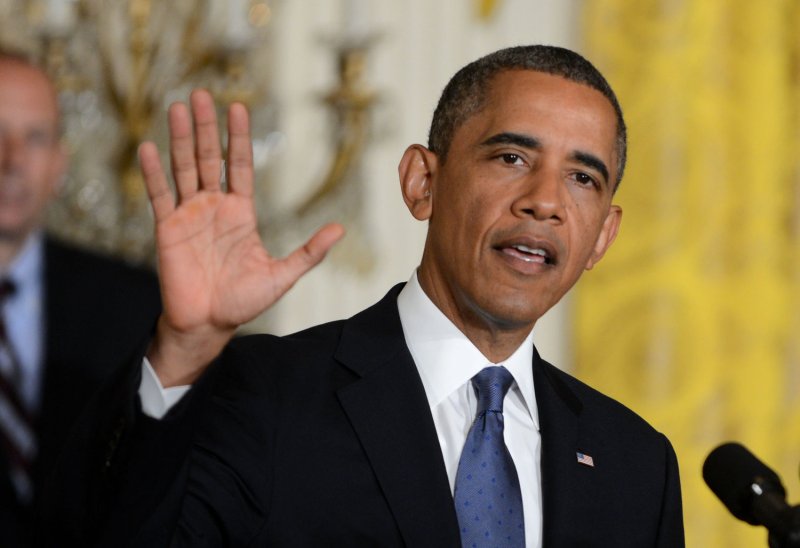President Barack Obama makes a point about the Affordable Care Act in a short speech in the East Room of the White House in Washington, DC on July 18, 2013. The president highlighted a provision in the healthcare bill, which is sometimes called Obamacare, that requires health insurers to devote at least 80 percent of their spending on medical care, or give rebates to consumers. He also noted a report that many self-insured New Yorkers will see their premiums drop by 50 percent. UPI/Pat Benic |
License Photo
COLLEGE PARK, Md., Oct. 24 (UPI) -- One need only compare the sense of dispatch at Federal Express with time endured to send a package via the U.S. Postal Service to recognize the U.S. government doesn't do things quite as well as the private sector. It doesn't even function as well as state bureaucracies.
Now Obamacare, which socializes an industry larger than the economies of France or Britain, is proving Health and Human Services can be more incompetent than many Third World governments. These past few weeks, poor Mexico could sign up urban poor for healthcare with less mess than Washington did folks needing insurance in San Antonio.
In Europe, national healthcare systems deliver coverage for everyone at remarkably lower cost and in countries with per capita income comparable to the United States, a lot better care. The United States spends 18 percent of gross domestic product on healthcare; Germany and Holland spend about 12 percent with better results.
One only need look behind the rollout of the federal health insurance exchanges to see why.
U.S. President Barack Obama sees every decision from the timing for sending his mother-in-law a birthday card to those required for the rollout of the exchange as a political calculation.
The bureaucrats at Health and Human Services ordered CGI, the private contractor primarily responsible for designing the exchanges, not to permit visitors to browse prices anonymously. That would allow young people with decent jobs to compare the prices they must pay for insurance, lest they face harsh penalties, with the subsidized prices offered other young folks with lower wage jobs.
After all, those jarring differences might cause young voters, whose allegiance to Obama has been weakened by an economic recovery that doesn't deliver decent prospects for their advancement to vote for whatever Republican promises less government and dares to run against Hillary Clinton.
This political decision was made less than a month before the exchanges went live and threw a terrible wrench into the rollout. Like the Internal Revenue Service decision to harass conservative non-profits and community activists, it isn't clear how high up that decision was made -- the HHS division directly supervising CGI, Secretary Kathleen Sibelius, or the White House.
Sibelius laments the online marketplace should require five years to construct and a year of testing. Yet California, whose economy is larger than most countries and has problems as complex, managed to get the job done. Its exchange and those of other states, designed independent of federal incompetence, are running well despite initial glitches.
A basic problem Washington doesn't like to admit is that the federal civil service is a refuge for overpaid, politically motivated and distracted-from-task statists, who are often cynical about the private sector and insensitive to citizens' needs.
Like the Godfather's henchmen, they look to what will please their political masters and act accordingly, even if it tramples civil liberties. Consider the allegedly independent handiwork of the IRS bureaucrats on nonprofits and citizens supporting conservative causes or Justice Department's wholesale violation of privacy of AP communications.
American universities' schools of business and engineering attract the best and the brightest -- not so schools of public policy, education and the softer social sciences that train foot soldiers that fill offices at HHS, Justice and the like.
Democrats in Congress are raising questions about HHS reliance on private contractors but the federal government simply doesn't have the resources to pull off something as large and complex as the healthcare exchange.
If the president wants Obamacare and other federal initiatives to succeed then he and his Cabinet can't make every decision a political calculation and recognize the government civil service needs much more competent employees, not political activists masquerading as public servants.
--
(Peter Morici, an economist and professor at the University of Maryland Robert H. Smith School of Business, is a widely published columnist. Follow him on Twitter: @pmorici1)
--
(United Press International's "Outside View" commentaries are written by outside contributors who specialize in a variety of important issues. The views expressed do not necessarily reflect those of United Press International. In the interests of creating an open forum, original submissions are invited.)















